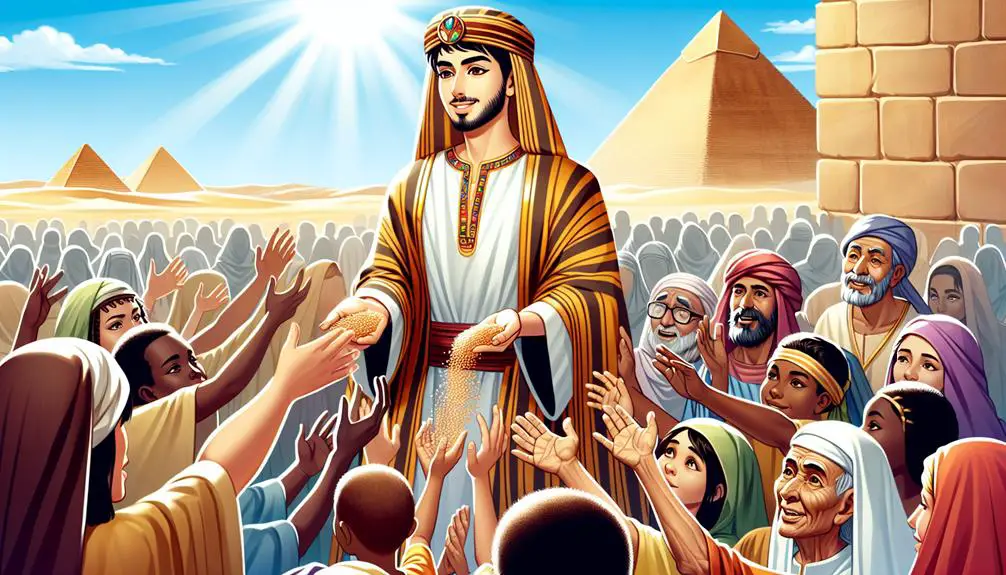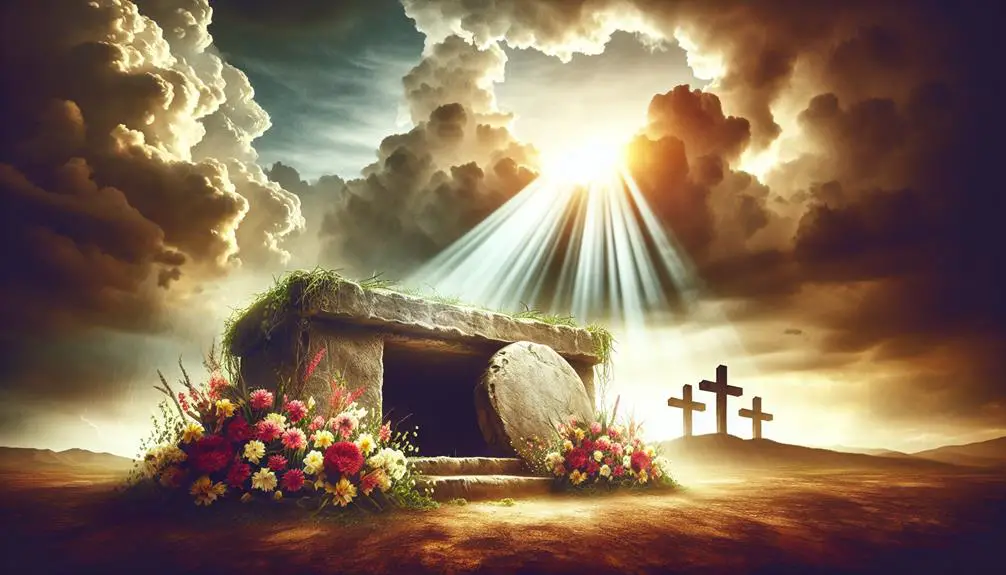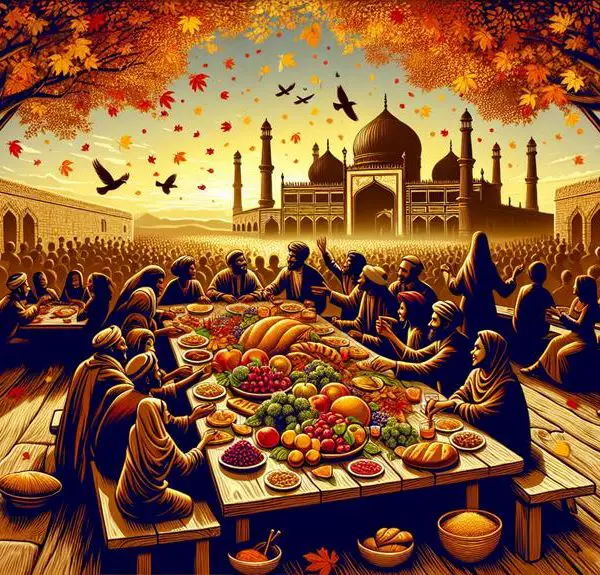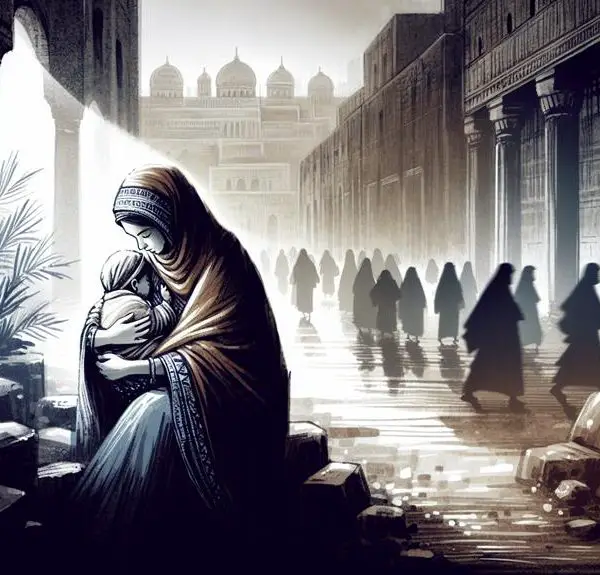Marvel at timeless tales of hope and resilience in the Bible, revealing lessons that inspire and guide us through today's challenges.

Story of Hope in the Bible
The Bible, a cornerstone of spiritual literature, is replete with narratives that encapsulate the essence of hope amidst adversity. From Noah's unwavering faith in the face of a cataclysmic flood, to Joseph's ascendancy from the depths of imprisonment to Egypt's echelons of power, these stories are not merely historical accounts but are imbued with profound lessons on resilience and redemption.
As we explore these timeless tales, one might ponder how the principles of hope articulated thousands of years ago continue to resonate and offer guidance in our contemporary quest for meaning and solace. What lessons can we learn from these ancient narratives that remain pertinent in navigating the complexities of modern life?
Key Takeaways
- Biblical stories emphasize hope through divine intervention and the triumph of faith in adversity.
- Narratives like Noah's Ark and the Resurrection illustrate renewal, second chances, and the promise of life beyond death.
- Characters such as Joseph and Esther showcase the importance of strategic action, resilience, and divine guidance in overcoming challenges.
- These stories offer believers inspiration for resilience, affirming the transformative power of faith and hope in dark times.
Noah and the Ark

The narrative of Noah and the Ark, as recounted in the Book of Genesis, serves as a profound allegory for hope and divine salvation amidst despair. Within this story, the concept of animal pairing emerges as a critical element, symbolizing not only the preservation of life on Earth but also the restoration of the world's order and balance post-catastrophe. The directive to Noah to bring into the ark a pair of every living creature underscores a divine intention towards regeneration and continuity of life. This pairing is emblematic of the binary nature of existence and survival, weaving together themes of unity, cooperation, and the intrinsic value of all life forms in the face of annihilation.
The ordeal of flood survival in the narrative further accentuates the theme of hope. The ark, a solitary vessel amidst the deluge, represents a microcosm of a new beginning. It is in this context that the ark becomes more than just a means of physical survival; it transforms into a beacon of hope for a future where humanity can start anew, grounded in righteousness and respect for the divine. The flood, while an act of judgment, also serves as a cleansing mechanism, purging the earth of its prior corruption and setting the stage for rebirth.
Analyzing the story through a scholarly lens, it becomes apparent that these elements—animal pairing and flood survival—are not merely literal aspects of the narrative but are imbued with rich symbolic significance. They exemplify the enduring human aspiration for renewal and the belief in the possibility of a second chance, even in the direst circumstances.
Joseph's Rise in Egypt

In the annals of biblical narratives, Joseph's ascent to prominence in Egypt exemplifies the intertwining of individual destiny with divine providence, highlighting the transformative power of resilience and wisdom in the face of adversity. His journey from a maligned sibling sold into slavery to a revered advisor of Pharaoh is a testament to his exceptional ability in dream interpretation and economic strategy. This story encapsulates several critical themes and lessons:
- Dream Interpretation: Joseph's adeptness at interpreting dreams was pivotal in his rise. His accurate interpretation of Pharaoh's dreams about the seven years of abundance followed by seven years of famine demonstrated not only his divine gift but also his analytical acumen.
- Economic Strategy: Joseph's foresight in devising a plan to store surplus grain during the years of abundance to be used during the years of famine showcased his exceptional planning and economic strategy. This not only saved Egypt from catastrophe but also established him as a key figure in Egyptian society.
- Resilience: Despite the betrayal by his brothers and the injustices he faced, Joseph's resilience in the face of adversity was remarkable. His story is a powerful example of overcoming obstacles through faith and perseverance.
- Wisdom and Morality: Joseph's decisions, guided by his moral compass and wisdom, played a critical role in his personal growth and the welfare of those around him.
- Divine Providence: Throughout Joseph's journey, the theme of divine providence is prominent, suggesting that his hardships and eventual success were part of a larger divine plan.
Joseph's story is a rich narrative of hope, demonstrating how wisdom, faith, and integrity can transform challenges into triumphs.
Job's Test of Faith

Amid the tapestry of biblical narratives, Job's ordeal stands as a profound exploration of faith under trial. The Book of Job delves into the existential questions of suffering and divine justice through the prism of Job's life, a man beset by profound loss and affliction, yet unwavering in his faith. At the heart of this narrative is Satan's wager with God—a test to strip Job of his blessings to reveal the true nature of his faithfulness. This divine gamble sets the stage for an unparalleled display of enduring patience and steadfast belief.
Job's narrative unfolds as a dramatic confrontation between the prosperity of the righteous and the seemingly arbitrary distribution of suffering. Satan challenges the authenticity of Job's piety, suggesting it is merely a byproduct of his wealth and well-being. As his tribulations mount—losing his possessions, his children, and being afflicted with grievous physical ailments—Job's faith is scrutinized not only by Satan but also by his friends, who suggest his sufferings are a result of his own failings.
However, Job's response is emblematic of enduring patience. Despite his profound grief and confusion, he refrains from cursing God, choosing instead to question and seek understanding. This story, therefore, is not just about suffering; it's a narrative that underscores the complexity of faith when confronted with the inexplicable. Job's unwavering faith amid unprecedented trials serves as a testament to the concept of trusting in divine wisdom, even when it defies human comprehension.
Daniel in the Lion's Den

Exploring another dimension of faith under duress, the narrative of Daniel in the Lion's Den offers a compelling account of divine deliverance and unyielding trust in God. This story, deeply embedded in Judeo-Christian religious texts, transcends a mere historical recount to embody a profound theological reflection on faith, loyalty, and divine intervention. At its core, Daniel's experience in the den illustrates the potency of steadfast faith in the face of seemingly insurmountable adversity.
Key elements of this narrative include:
- The Decree: Daniel's unwavering commitment to his faith led to his violation of a royal decree, making prayer a capital offense.
- The Punishment: His punishment, being thrown into a den of lions, symbolizes the ultimate test of faith and trust in divine protection.
- Lion's Symbolism: Traditionally, lions represent strength, ferocity, and kingship. In this context, they also symbolize the seemingly insurmountable challenges and threats to faith.
- Divine Intervention: The miraculous safeguarding of Daniel from harm underscores a central theological theme: God's deliverance of those who remain faithful.
- Daniel's Faith: Daniel's unwavering trust in God, even when facing death, serves as a powerful testament to the strength and resilience of faith under pressure.
Analytically, the narrative serves as a rich text for exploring themes of faith, the nature of divine intervention, and the moral and ethical dilemmas faced by individuals committed to their spiritual beliefs. It prompts a reevaluation of the relationship between divine providence and human agency, offering a timeless reflection on the dynamics of faith in the face of adversity.
Esther's Courageous Victory

Through the narrative of Esther's courageous victory, the Bible presents a nuanced exploration of faith, identity, and the power of strategic action within a context of existential threat. Esther's story unfolds in the Persian Empire, where she rises from obscurity to become queen through her victory in a royal beauty pageant, a critical turning point that sets the stage for her later acts of bravery. This tale intricately weaves together themes of providence, risk, and the use of one's position for the greater good, challenging readers to consider the complex interplay between divine sovereignty and human agency.
The climax of Esther's story occurs at a royal banquet, a meticulously planned event that reveals the depth of her strategic thinking. Here, Esther risks her life to unveil a plot against her people, leveraging her influence over King Ahasuerus to secure their safety. This act of courage not only averts genocide but also underscores the transformative power of individual action in the face of overwhelming adversity.
Esther's narrative is emblematic of the broader biblical theme of hope amidst despair. Her victory is not just a personal achievement but a communal triumph, highlighting the potential for deliverance and redemption even in the darkest of times. Through her, the Bible conveys a message of resilience, showing how faith, coupled with decisive action, can forge pathways to survival and victory against seemingly insurmountable odds.
In essence, Esther's story is a profound testament to the capacity of faith and courage to change the course of history, offering timeless insights into the human condition and the possibility of hope and renewal.
The Resurrection of Jesus

The Resurrection of Jesus stands as a pivotal event within Christian theology, symbolizing not only the triumph over death but also affirming the core of Christian hope. Its significance extends beyond a mere historical event, impacting believers by offering a foundation for faith and a promise of life beyond death.
This discussion aims to explore the multifaceted implications of the Resurrection on both individual and collective levels of faith.
Significance of Resurrection
In Christian theology, the resurrection of Jesus Christ stands as a pivotal event, symbolizing triumph over death and the foundation for believers' hope in eternal life. This cornerstone of faith not only underscores the promise of eternal life but also fosters renewed faith among Christians, anchoring their beliefs in the transformative power of Jesus's resurrection.
- Represents the fulfillment of Old Testament prophecies, affirming Jesus's divinity.
- Validates the concept of bodily resurrection, offering a tangible hope in the afterlife.
- Demonstrates God's omnipotence and loving plan for human redemption.
- Serves as the basis for Christian sacraments, particularly baptism and Eucharist.
- Signals the defeat of sin and death, emphasizing the possibility of new beginnings and spiritual rebirth.
Impact on Believers
Embracing the resurrection of Jesus as a fundamental truth, believers find their faith profoundly strengthened, viewing this event as a direct affirmation of life beyond mortal existence. This cornerstone belief not only serves as faith reinforcement but also catalyzes spiritual growth among adherents.
The perceived victory over death through Jesus' resurrection imbues followers with a sense of hope and resilience, fostering a deeper commitment to spiritual practices and ethical living. Analyzing this phenomenon through a scholarly lens reveals a dynamic interplay between belief in the resurrection and the believer's personal and communal life.
It underscores the transformative impact of this event, suggesting that the resurrection acts as a pivotal moment for spiritual rejuvenation and moral recalibration among Christians, thereby contributing to a sustained and evolving faith journey.
Frequently Asked Questions
How Do the Biblical Stories of Hope Relate to Modern-Day Issues Like Mental Health and Climate Change?
Biblical narratives of hope offer insights into personal resilience and societal recovery, themes highly relevant to contemporary challenges such as mental health and climate change. These ancient stories provide frameworks for understanding perseverance in the face of adversity, encouraging a collective and individual response to modern crises.
Analyzing these narratives through a scholarly lens reveals their potential to inspire actions towards mental wellness and environmental sustainability, demonstrating their enduring relevance and applicability.
In What Ways Have Different Cultures and Religions Interpreted the Concept of Hope in These Biblical Narratives?
Different cultures and religions have uniquely interpreted the concept of hope through the lens of cultural syncretism, blending their own traditions with the narratives encountered in these stories.
Artistic interpretations across various mediums have further diversified these perspectives, offering a rich tapestry of understanding that transcends original contexts.
This multifaceted approach enriches the dialogue on hope, allowing it to resonate universally amidst diverse global contexts and belief systems.
How Do Biblical Scholars Reconcile the Themes of Hope in These Stories With the Concept of Free Will and Predestination?
Biblical scholars navigate the reconciliation of hope with free will and predestination by examining the balance between divine sovereignty and human responsibility.
Analytically, they delve into scriptural narratives, interpreting how the themes of hope are intricately linked with the concepts of divine intervention and human choice.
This scholarly exploration emphasizes an objective understanding that while divine plans are sovereign, they do not negate the importance of human actions and decisions in the manifestation of hope.
Can These Stories of Hope in the Bible Provide Insight Into Overcoming Personal Failures and Setbacks Not Related to Faith?
Navigating through life's tempestuous seas, personal resilience and overcoming adversity are central to transcending personal failures and setbacks.
An analytical exploration reveals that narratives, irrespective of their origin, serve as a beacon, guiding individuals towards introspection and growth.
Specifically, stories imbued with hope offer profound insights into the human condition, encouraging a reevaluation of challenges as opportunities for development, thereby fostering a mindset geared towards resilience and perseverance in the face of adversity.
What Are the Psychological Impacts of Reading and Reflecting on These Biblical Stories of Hope, According to Contemporary Research?
Contemporary research indicates that reading and reflecting on narratives of hope can have profound psychological impacts.
The neurological effects include enhanced brain connectivity in areas associated with empathy and understanding.
Moreover, engaging with these stories fosters emotional resilience, aiding individuals in coping with personal failures and setbacks.
This resilience is cultivated through identification with narratives that emphasize perseverance, ultimately contributing to psychological well-being and adaptive coping mechanisms.
Conclusion
In conclusion, these narratives from the biblical canon exemplify resilience, faith, and redemption amidst adversity. Noah, Joseph, Job, Daniel, Esther, and the culmination in the resurrection of Jesus serve as archetypal examples of perseverance against overwhelming odds.
Their stories offer a rich tapestry of hope, illustrating the transformative power of faith and courage. Through scholarly analysis, one discerns the universal themes of human endurance and the potential for renewal, even in the darkest of circumstances.



Sign up